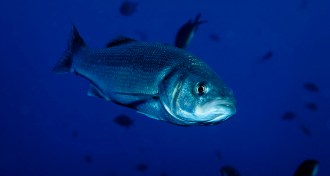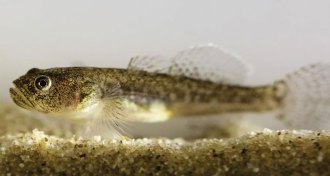Uncategorized
-
 Genetics
GeneticsGenetic surgery is closer to reality
A molecular scalpel called CRISPR/Cas9 has made gene editing possible.
-
 Astronomy
AstronomyProxima b deserves buzz, even if some didn’t notice
Editor in chief Eva Emerson discusses Earth's newest potentially habitable neighbor.
By Eva Emerson -
 Health & Medicine
Health & MedicineReaders contemplate aging research
Aging research, dino guts and Earth's quasisatellite in reader feedback.
-
 Oceans
OceansFish escapes from marine farms raise concerns about wildlife
Farmed salmon, sea bass and other fish frequently escape from sea cages into the ocean. Will these runaways harm native wildlife?
By Roberta Kwok -
 Paleontology
PaleontologyPreteen tetrapods identified by bone scans
Roughly 360 million years ago, young tetrapods may have schooled together during prolonged years as juveniles in the water.
By Susan Milius -
 Microbes
MicrobesMicrobial matter comes out of the dark
Undiscovered bacteria challenge what scientists know about microbial life.
By Laura Beil -
 Planetary Science
Planetary SciencePhilae lander spotted on comet 67P
Missing since November 2014, the Philae comet lander has been found lurking in the shadows on comet 67P/Churyumov-Gerasimenko.
-
 Particle Physics
Particle PhysicsSupersymmetry’s absence at LHC puzzles physicists
Accelerator experiments find no evidence to support popular particle physics theory known as supersymmetry.
-
 Life
LifeCalifornia’s goby is actually two different fish
One fish, two fish: California’s tidewater goby is two species.
-
 Animals
AnimalsDwarf lemurs don’t agree on sleep
Fat-tailed dwarf lemurs’ surprising hibernation-sleep doesn’t show up in ground-hibernating relatives.
By Susan Milius -
 Animals
AnimalsBonobos adept at nut cracking
Bonobos demonstrate their overlooked nut-cracking skills in an African sanctuary.
By Bruce Bower -
 Humans
HumansCognitive scientist puts profanity in its place
Swearing provides unappreciated insights into human thought and language, a cognitive scientist argues in the new book What the F.
By Bruce Bower